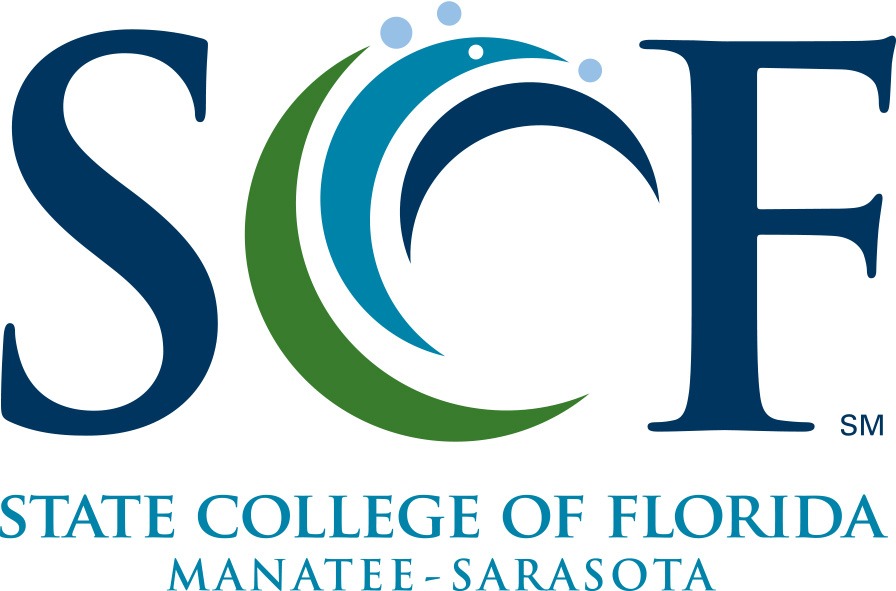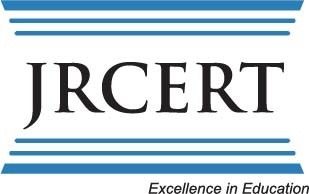Radiography
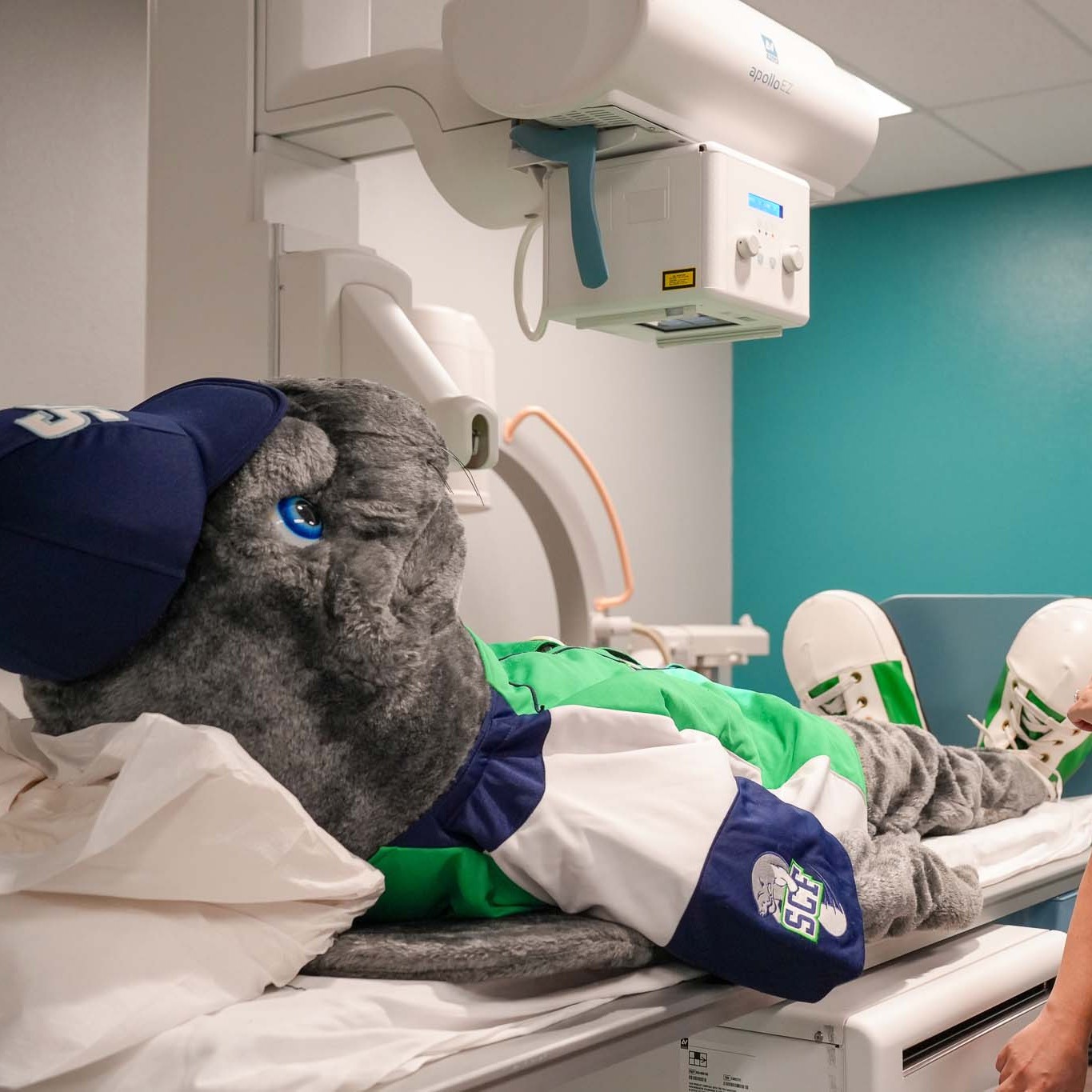
The Radiography Program combines didactic and clinical education to prepare the graduate for a career as a radiographer. These health care professionals work in various medical settings producing radiographic images, assisting physicians during advanced radiographic procedures, determining safe exposure limits and providing appropriate patient care during procedures to produce filmless digital images. During the program, students are rotated through several different health care facilities that are located within a 50 mile radius of SCF Bradenton. Student clinical rotations are scheduled during the weekdays and can occur between the hours of 7 a.m. and 8 p.m., depending on the schedule of the facility.
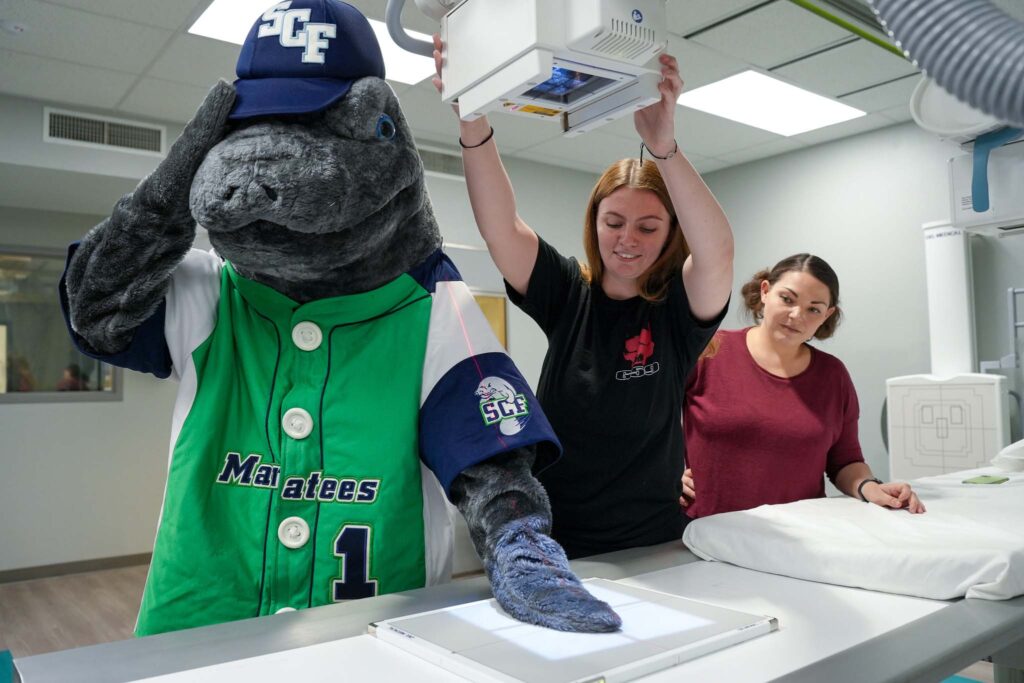
A.S. Degree
Graduates of the program are eligible to take the American Registry of Radiologic Technologists National Examination to become a registered radiographer.
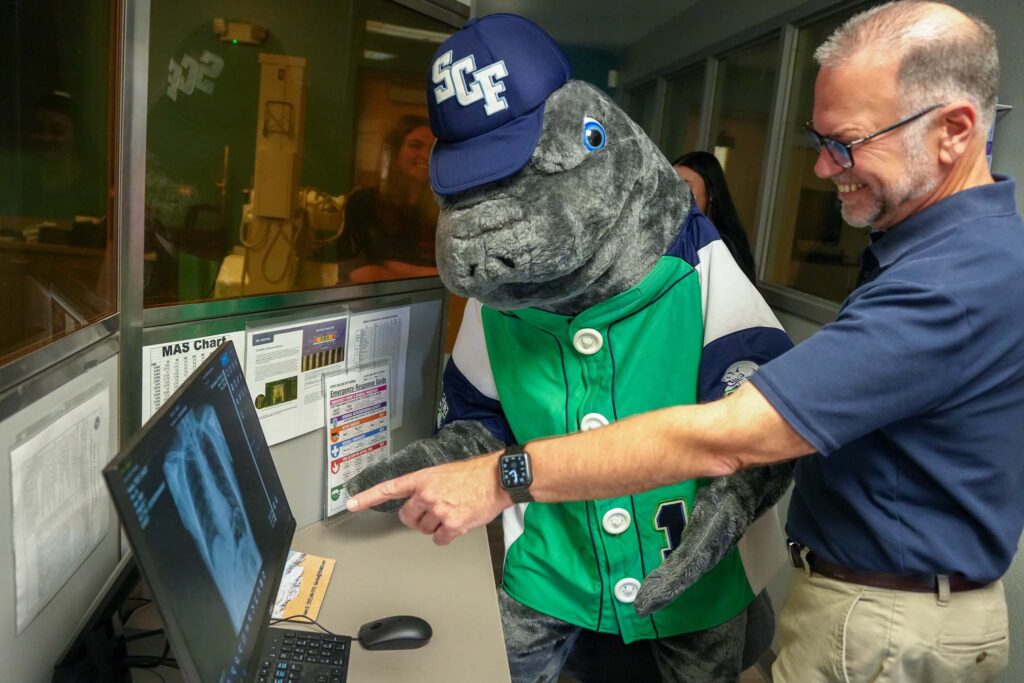
ARRT Articulated
To enable Registered Technologists students who have graduated from a hospital-based radiography program and currently are registered with the American Registry of Radiologic Technologists (ARRT) to acquire an Associate in Science in Radiography.
Upon completion of the program, the graduate is eligible to take the American Registry of Radiologic Technologist Exam to become a registered radiographer. This registry is accepted in any state and many foreign countries. Employment opportunities exist in emergency centers, doctors offices, hospitals and industries. Opportunities exist for all combinations of working hours. The radiographer works closely with physicians and other members of the health care team to assure quality medical care.
Program Goals and Student Learning Outcomes
The radiography program’s goal is to provide the community with competent and caring entry level radiographers who are able to perform quality radiographic procedures and function as an integral member of the health care team. In order to achieve this, the program provides the student with innovative educational opportunities to prepare for a rewarding career in radiologic technology.
Goal: 1 Students will be clinically competent.
- Student Learning Outcomes:
- Students will properly position the patient.
- Students will provide appropriate patient care.
- Students will properly manipulate equipment.
Goal: 2 Students will demonstrate effective communication.
- Student Learning Outcomes:
- Students will demonstrate effective communication skills.
- Students will demonstrate effective written communication skills.
Goal: 3 Students will utilize critical thinking skills.
- Student Learning Outcomes:
- Students will perform non-routine procedures.
- Students will analyze images.
The program monitors its success of meeting program goals through its Outcomes Assessment Plan. This plan includes student learning outcomes, tools, and benchmarks which are used to assess student performance for each of the program goals. The outcomes are then analyzed and the data is used for continual program improvement.
About the Profession
Radiology is the branch of medicine that uses different forms of radiation to produce images that aid in the diagnosis or treatment of disease. The radiographic images, used in diagnosis are produced by the radiographer. These images are then interpreted by the radiologist (a physician) to diagnose and recommend treatment of disease.
The radiography program prepares individuals to become radiologic technologists. Radiologic technologists are the medical personnel who perform diagnostic imaging examinations. They are educated in anatomy, patient positioning, examination techniques, equipment protocols, radiation safety, radiation protection and basic patient care.
Radiographers work in a variety of settings including hospitals, diagnostic centers, doctor’s offices, clinics and orthopedic practices. Advanced career options in education, administration and research are also possible. Daily tasks of radiographers include:
- Positioning imaging equipment and adjusting controls to produce diagnostic quality images.
- Assisting the radiologist in performing specialized imaging procedures.
- Preparing patients for radiologic examinations by explaining the procedure and gathering pertinent clinical data.
- Assessing patient condition and utilizing professional judgment and critical thinking to modify procedures as necessary.
- Providing accurate explanations and instructions to the patient and addressing patient questions and concerns regarding the procedure when appropriate.
- Administering contrast agents according to established guidelines and monitoring the patient for adverse reactions.
- Documenting diagnostic and patient information in the appropriate record according to established criteria and procedures.
- Collaborating with physicians and other members of the healthcare team to elevate the quality of patient care.
Program Information:
An important component of any Radiography Program is the clinical experience. The clinical experience assists the student in transferring knowledge acquired in the classroom to practical application in the clinical setting.
SCF’s Radiography program practicum courses are designed to allow students to apply skills learned in the classroom and laboratory setting immediately in the clinical environment. This is accomplished by scheduling first year radiography students in the hospitals and clinics on Tuesday and Thursday of each week. During their second year, students are scheduled in the clinics on Monday, Wednesday and Friday each week. In the Practicum III course, which is offered during the second summer semester of the program, students are scheduled in the hospitals and clinics 4 days a week.
During the program, students are rotated through several different health care facilities that are located within a 50 mile radius of the SCF Bradenton Campus. Student clinical rotations are scheduled during the weekdays and can occur between the hours of 7:00 a.m. and 8:00 p.m. depending on the schedule of the facility.
Currently the program affiliates with the following hospitals and clinics:
- Blake Medical Center
- Children’s Orthopedic and Scoliosis Surgery Associates (Tampa)
- Coastal Orthopedics
- Doctors Hospital of Sarasota
- Lakewood Ranch Medical Center
- Manatee Diagnostic Center
- Manatee Memorial Hospital
- Radiology Associates of Venice & Englewood
- Sarasota Memorial Hospital-Venice
- South Shore Hospital
SCF provides a group professional liability policy on all Nursing & Health Professions students and a separate limited accidental health policy for all Nursing & Health Professions students paid for by student fees. This policy is only effective for incidents which occur in classroom, laboratory, and at clinical sites.
Because these clinical sites are independent agencies, they have strict rules and regulations regarding students from any health science program rotating through their facility. Therefore, background checks, current CPR certification, TB testing, appropriate vaccinations, and health and drug screenings are required by these agencies. The student is advised that based on the results of these checks and screenings, prospective students may become ineligible for program admission.
Continuation in the program is based on acceptable results from random/ongoing screenings and background checks. Clinical facilities may limit or prohibit students with positive drug screen results or criminal histories from participating in clinical experiences, thus making the student ineligible to continue in the program. Students are responsible for all fees incurred with these checks and screening.
Performance Standards for Admission, Progression, and Graduation in the Radiography Program at State College of Florida, Manatee – Sarasota.
Successful participation and completion of the Radiography Program requires that a candidate be able to meet the demands of the program. Radiography students must be able to perform academically in a safe, reliable and efficient manner in classrooms, laboratory and clinical situations. The student must demonstrate behaviors, skills and abilities that are in compliance with legal and ethical standards as set forth by the ASRT Code of Ethics and Standards of Practice.
Throughout the program, students acquire the foundation of knowledge, attitude, skills and behaviors that are necessary to function as a radiographer. Those abilities that the radiographer must possess to practice safely are reflected in the standards that follow.Candidates for the degree must be able to meet these minimum standards, with or without reasonable accommodation, for successful completion of degree requirements.
| STANDARD | EXAMPLES | |
|---|---|---|
| Critical Thinking | Demonstrates critical thinking ability sufficient for clinical judgment and problem solving. | Applies critical thinking processes to their work in the classroom and various clinical settings.
Exercises sound judgment in class and in clinic. Follows safety procedures established for each class and clinic. Demonstrates ability to self-evaluate. Demonstrates the ability to anticipate the next step in the clinical setting. Demonstrates ability to identify problems and offer possible solutions. |
| Interpersonal | Demonstrates the ability to relate to other people beyond giving and receiving instructions.Cooperates with others. | Demonstrates interest in classmates, faculty, patients/clients.
Demonstrates the ability to get along with and cooperate with others. Demonstrates ability to relate to other people beyond giving and receiving instructions. Demonstrates ability to maintain poise and flexibility in stressful or changing conditions. Recognizes and responds appropriately to individuals of all ages, genders, races, socio-economic, religious, sexual preferences, and cultural backgrounds. |
| Communication | Demonstrates the ability to communicate clearly with patients/clients, physicians, other health professionals, family members, significant others, caregivers, community or professional groups and colleagues.Communication includes: speech, language, nonverbal, reading, writing and computer literacy. | Accurately documents patient histories
Accurately documents appropriate information on patients’ charts. Responds to patient calling or any other warning call and machine alarm. Educates patients about radiographic procedures about to be performed. |
| Motor Skills | Demonstrates the ability to execute motor movements reasonably required to provide general and emergency care and treatment to patients/clients. | Properly manipulates various radiographic equipment.
Exhibits sufficient manual dexterity to perform radiographic procedures. Moves independently throughout the radiography department and various hospital departments Provides for patient/client safety and well being in all procedures or transporting activities. Performs CPR |
| Hearing | Demonstrates functional use of hearing to monitor and assess health needs. | Demonstrates ability to obtain appropriate medical history directly from the patient/client or guardian.
Responds to monitor alarms or cry for help. |
| Visual | Demonstrates visual acuity and perception sufficient for observation and assessment. | Demonstrates ability to observe lectures, and laboratory demonstrations.
Receives information via observation from patients/clients, i.e. changing patient conditions Can visualize radiographs to assess for diagnostic quality. |
| Tactile | Demonstrates tactile ability sufficient to gather assessment information and perform radiographic procedures. | Senses changes in patient condition in order to gather objective evaluative information.
Palpates bony landmarks. |
| Self Care | Maintains general good health and self care in order not to jeopardize the health and safety of self and individuals with whom one interacts in the academic and clinical setting. | Maintains hygiene.
Demonstrates safety habits and work area neatness. Maintains a healthy lifestyle. |
| Intellectual Abilities | Demonstrates ability to read, write, speak and understand English at a level consistent with successful course completion and development of a positive patient-student relationship. | Demonstrates ability to comprehend and follow instructions.
Demonstrates ability to perform simple and repetitive tasks. Can learn to reconcile conflicting information Written communication: Demonstrates ability to use proper punctuation, grammar, spelling; work is neat and legible. |
| Commitment to Learning | Demonstrates positive attitude towards decision-making, policies and operating methods, rules, etc. | Completes readings, assignments, and other activities outside of class hours.
Demonstrates initiative, motivation and enthusiasm. Does not cheat or plagiarize. |
| Affective Learning Skills(Behavioral & Social Attitudes) | Demonstrate appropriate affective behaviors and mental attitudes in order not to jeopardize the emotional, physical, mental and behavioral safety of clients and other individuals with whom one interacts in the academic and clinical setting.Acknowledges and respects individual values and opinions in order to foster harmonious working relationships with colleagues, peers and patients/clients. | Demonstrates ability to sustain the mental and emotional rigors of a demanding educational program, which includes an academic and clinical component, that occur within set time constraints.
Demonstrates willingness to accept challenges. Open to feedback. Listens actively. |
If a student cannot demonstrate the skills and abilities identified above, it is the responsibility of the student to request an appropriate accommodation. The College will provide reasonable accommodation as long as it does not fundamentally alter the nature of the program offered and does not impose an undue hardship such as those that cause a significant expense, difficulty or are unduly disruptive to the educational process.
FAQs | Frequently Asked Questions
• Students are encouraged to meet with a College & Career Success Coach if they have questions regarding course and degree selection. (Advising Center 941-752-5035)
• Visit SCF.edu/radiography for program details and updated information.
• Attend a virtual Radiography Information Session – you can view video at scf.edu/programs/radiography/?
• Contact the Radiography Program department at 941-752-5245 or email radiography@scf.edu.
Current program tuition information is posted on the program website under Radiography Program Information “Estimated cost of the Program – Tuition and Fees”. A $35 application fee which is good for three (3) consecutive years is also required. After the three (3) consecutive cycles, the application fee must be paid again.
•Radiography Program applications are accepted in January for the program which starts once a year at the start of the summer term.
•Details for submitting a program application will be posted on scf.edu/program/radiography/?. Please check the website frequently for upcoming details.
No, if students apply and are not selected, they must re-apply the following year to be considered for admission.
Approximately Seventeen (17) students are selected for the program annually; approximately 50-80 students apply for acceptance annually.
Yes, per the current SCF college catalog, and grade forgiveness policy, students can request to retake a course that they have successfully completed earning a grade of B or C.
Students may also reattempt courses following an unsuccessful attempt, in which a grade of D, F, W or WF has been earned.
NOTE:
• Approval and grade improvement does not guarantee admission to the program.
• No more than two programs are required or prerequisite courses can be repeated.
• No more than one retake will be allowed per course.
• The most recent grade will be used for program admission requirements.
• Interested students must complete the Request to Retake A Course Form with the Program Director Approval.
In addition to the admission requirements for college, the following are requirements for applying to the program:
1. Earned a minimum grade point average (GPA) of 2.5 or better in ALL general education courses required by the program toward the degree and a minimum overall GPA of 2.0 to meet graduation requirements.
2. Satisfactory completion of any remedial coursework needed to be eligible for college-level courses.
NOTE: Prerequisite courses may be required for ENC 1101 and Area II Math. These prerequisite courses MUST be taken PRIOR to entry into the Radiography Program to be eligible to take the required courses. Consult the course descriptions in the online Catalog at scf.edu/Catalog for additional information.
3. Attend a virtual Radiography Information Session https://www.scf.edu/Academics/Radiography
4. Program prerequisite courses MUST be completed with the following grades by the end of the Fall term prior to the year in which the applicant is applying.
• BSC 2085C Anatomy and Physiology I (Grade of B or better)
• MATH: Any Area II Math course for the A.S. degree (Grade of C or Better)
5. A minimum grade of “C” is required for all courses applied towards the Radiography degree, with the exception of Anatomy and Physiology I, as noted above.
6. A completed application for the Radiography Program and a $35 application fee which is good for three (3) consecutive years is required. (If not an active SCF student, a separate application is required for admission to the College along with a $20 application fee.)
Note: Completion of all or part of the required academic courses does not assure acceptance into the program.
Go to scf.edu/program/radiography/ and scroll down to General Academic Courses to view the list of prerequisite and general academic courses (20 credit hours.) Students are encouraged to complete as many of the academic courses as possible before entering the program.
The Radiography Program is a limited enrollment program, so applicant priority is determined by these criteria:
1. election will be based on applicants who have completed all prerequisite courses and completion of general education courses towards the degree by the end of the Fall term preceding the year for which the applicant is applying. Any required program academic course in progress during the application window will not be used in the selection process.
2. Submit a limited enrollment application during the application period and pay the application fee.
3.If there is more than one student for the final seat in the program, the selection criteria will be the overall GPA.
Note: The Program GPA is calculated from the required General Academic Courses for the Radiography program, not the overall GPA.
Students not accepted into the program must reapply for admission the following year.
Students are notified of acceptance or denial any time after applications have closed but no later than 8 weeks after the program application deadline. Applicant status will be communicated via their SCF student email. It is imperative that students check their SCF email (including the junk folder) frequently. Best practice to check on a computer and not your phone. You will have one week to respond.
This is a two-year program which begins at the start of the the Summer term of the year the student is accepted. The sequence of terms once accepted into the Radiography program is Summer, Fall, Spring, Summer, Fall, Spring. Students can expect a full-time schedule beginning the Fall semester. (24 consecutive months)
The Radiography program is located on the SCF Bradenton Campus in Building #2. Radiography Program classwork and clinical experience are designed to be taken in sequence; therefore, students must adhere to the schedule given to them. Classes are scheduled during week days, between the hours of 8:00 a.m.-2:30 p.m. for first year students with clinical experience 2 days a week (T,R), and 8:30 a.m.-6:00 p.m. for second year students with clinical experience 3 days a week (M, W, F). However, this can change. Throughout the program, students will be rotated through various clinical affiliates which may be scheduled between the hours of 7:00 a.m.-8:00 p.m. Each of these rotations offers unique clinical experiences for the students. If students must work outside the program, past program history has shown that working more than 20 hours a week decreases success in the program.
Student health information is required by the clinical agencies. The agencies will not allow any student entry unless the SCF Division of Health Professions can provide documentation that all these requirements are met. The titer
is a blood test that determines a student’s current immunity to communicable diseases.
Students enrolled should understand that the required clinical experience in various healthcare facilities may expose them to environmental hazards, infectious disease, and blood borne pathogens including, but not limited to Tuberculosis, Hepatitis B, HIV/AIDS, and other viruses.
Clinical agencies also require background checks to participate in the clinical experience at their facility. Based on the results of the background check, students may become ineligible for program admission.
The “What If” Degree Audit enables the student to run an electronic degree audit/evaluation via MySCF. The audit shows degree completion requirements and GPA. The selection team uses the audit to evaluate an applicant for program selection.
NOTE: All transcripts must be received and evaluated by the Registrar’s office.
Please see the Radiography Application Instructions at scf.edu/program/radiography for directions.
Applicants who have been involved in a criminal proceeding or who have been charged or convicted of a crime are advised to request a pre-application review with the American Registry of Radiologic Technologist (www.arrt.org) in order to obtain a ruling on the impact of the situation on their eligibility for certification and registration after graduation.
Upon acceptance to the program, the following are required: background checks, appropriate vaccinations, CPR certification, health and drug screenings, and possible fingerprinting to meet local health care regulations. This package runs about $200.00. Based on the results of these checks and screenings, students may become ineligible for program admission. Continuation in the program is based on acceptable results from random/ongoing screenings and background checks. Clinical facilities may limit or prohibit students with positive drug screen results or criminal histories from participating in clinical experiences, thus making the student ineligible to continue in the program. Students are responsible for all fees incurred with these checks and screenings.
The applicant should be aware that the State of Florida periodically changes the laws in relation to persons with criminal backgrounds being licensed in Florida. It is the prospective student’s decision to enter the program based upon the knowledge and understanding that he or she may, or may not, be granted the right to be licensed in the State of Florida upon graduation.
Program Duration/Readmission Policy
The Radiography Program is designed to be completed in two years beginning in May of each year. In order to progress through the program, students must complete all Radiography courses with a grade of “C” or above, or a “P” in clinical and laboratory courses. Students receiving a grade of “D” or lower in any Radiography course or a “NP” in any clinical or laboratory course will be dismissed from the program.
If a student leaves the program because of unsatisfactory grades, the student has a one-time opportunity to re-enter the program, should space be available, and repeat unsatisfactorily completed courses the next time the courses are offered. Students who successfully complete repeated courses will be allowed to continue in the program from the point in the curriculum where they originally exited.
If a student should voluntarily withdraw from the program, and has satisfactorily completed all course requirements up to that point, the student has the option to reapply to the program for a period of 12 months after leaving the program. Should space be available, the student will be re-admitted into the program to complete the remaining required courses.
Students re-entering the program will be required to take assessment tests or perform simulated radiography exams to determine knowledge and retention of previously learned material. The student must make an appointment with the Program Director and clinical coordinator at least one semester prior to the anticipated entry date. The student, Program Director, and clinical coordinator will develop an Educational Plan to focus on the remediation of skills and knowledge. This plan must be completed prior to the start of the semester the student is to re-enter the program.
Readmitted students who return to the program will be held to the policies and procedures of the college catalog and student handbook and curriculum that is in place for the semester in which they are returning.
Readmission options can only be used one time. Students who unsatisfactorily complete a repeated radiography course will be dismissed from the program with no further consideration for re-admission.
